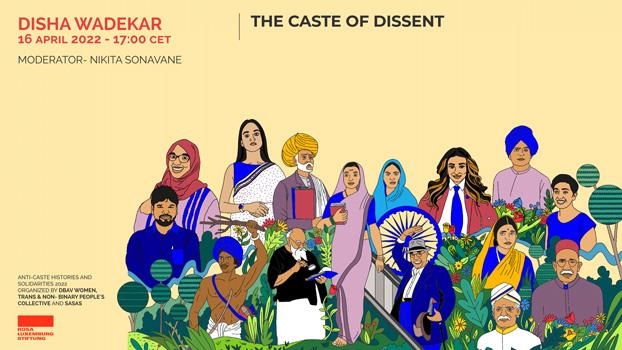
Dalit, Bahujan, Adivasi, Vimukta, and other anti-caste communities in South Asia, have long-standing histories of fighting against caste oppression. In their efforts, these diverse communities have envisioned democratic futures, futures free of caste, be it in the form of the utopia of Begumpura (city without sorrows) or by converting into other egalitarian faiths or imagining collective identities. For long, these communities have fostered solidarities that have been in the making, at times contested, other times fragile, and yet other times strong and emancipatory. Through oral histories, these knowledge communities have passed on equally emancipatory ideologies. With each passing generation, they have reimagined and redefined themselves. To commemorate this rich past and to continue the contemporary dialectics, ‘Dalit Bahujan Adivasi Vimukta Women, Trans, Non-binary People’s Collective’ and ‘South Asian Scholars and Activists Solidarity’ bring forth this ‘Anti-caste Histories and Solidarities’ lecture series in collaboration with Rosa-Luxemburg-Stiftung.
In this series, some contemporary intellectuals, writers, artists, and activists from diverse anti-caste locations will reflect on pertinent questions: how do historically oppressed diverse communities with emancipatory movement histories investigate, imagine, and build anti-caste solidarities? Why is engagement with these histories and solidarities critical? How caste still dominates and shapes the lived realities of Dalits and many other marginalized groups in India? How do the state and its system as it exists fails and yet remain the only source for the oppressed castes and minorities to seek justice? These are some of the challenging questions scholars and activists of anti-caste scholarship and movements have engaged with for several decades. Yet many questions remain unanswered, get distorted, or remain sidelined due to their complexities. This lecture series attempts to engage with these complex questions in the spirit of continuing the knowledge exchange.
The Caste of Dissent
16/04/2022 at 17.00 CET
Moderated by Nikita Sonavane
Registration link: https://us06web.zoom.us/webinar/register/WN_qscK5MnKTVKB5HJFOEpOaw
The discussion will be held as an online seminar in English. Preregistration is necessary.
The speaker would attempt to problematise the popular discourse around dissent that mainly focuses on the category of political prisoners (dissenting individuals) while systematically erasing the experiences of the historically criminalised communities (dissenting identities). The socio-cultural presence and assertions of marginalised castes, tribal and nomadic communities have been a constant threat to the Brahmanical State. Despite this, their resistance in the face of persistent state persecution and atrocities has not been treated as “valid dissent.” The criminalisation and targeting by laws and the modern criminal justice system is a unique tool resorted to by the Brahmanical State to disenfranchise "dissenting communities." However, the near absence of caste-tribe analysis on dissent has invisibilised the problem of Dalit-Bahujan, Adivasi, and Vimukta incarceration. On the one hand, the hyper-visibility and over-surveillance of marginalised communities vis-a-vis the criminal justice system and their erasure in the popular discourse on dissent is ‘an absented presence always in erasure.’
Disha Wadekar is an independent advocate practising in the Supreme Court of India. She has previously worked as an associate at the chambers of Sr. Adv. Indira Jaising on constitutional bench matters, including the Sabarimala and Jarnail Singh (reservation in promotions) cases.
Wadekar has also headed a legal resource centre in India set up as a London School of Economics project. In addition, she has worked as a Consultant Advocate for the Death Penalty Project at National Law University, Delhi, and the Centre for Women’s Development Studies, New Delhi. Furthermore, she is the first Law and Justice Visiting Scholar at Jindal Global Law School, where she teaches a course on Caste, Courts, and the Constitution. She is the co-founder and President of CEDE- an organisation working towards a diverse and inclusive legal profession and the judiciary. In addition, she regularly writes for various media platforms on the dynamics of law and marginalisation.
Nikita Sonavane has worked as a legal researcher and an advocate for five years. She has co-founded the ‘Criminal Justice and Police Accountability Project (CPAProject).’ CPAProject is a Bhopal-based litigation, and research intervention focused on building accountability against the criminalisation of marginalised communities by the Police and the criminal justice system. Her writings have been at the intersection of policing, caste, and digitisation of the criminal justice system in India. Nikita has previously worked on issues of local governance, forest rights, and gender in the Adivasi region of Dang in Gujarat. She graduated with a BA (Political Science) degree from St. Xavier’s College, Mumbai, and an LL.B. degree from Government Law College, Mumbai. Nikita holds an LL.M in Law and Development. Nikita has previously worked on issues of local governance, forest rights, and gender in the Adivasi region of Dang in Gujarat. She graduated with a B.A. (Political Science) degree from St. Xavier’s College, Mumbai and an LL.B. degree from Government Law College, Mumbai. Nikita holds an LL.M in Law and Development degree from Azim Premji University (APU), Bangalore. Her writings have been published by the AI Now Institute at NYU, Indian Express, the Hindu, Caravan among others.